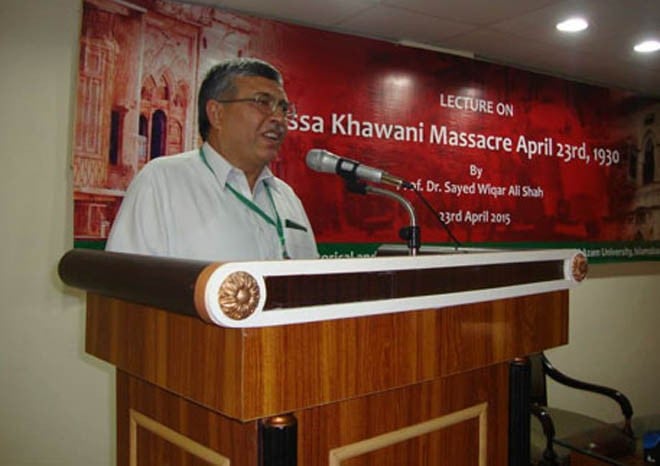
Dr Sayed Wiqar Ali Shah’s removal for call to revisit Pakistan’s history shows that our obsession with uniformity has cost us dearly

Intolerance has plagued Pakistani society to the core. What makes it worse is the creeping of bigotry into institute of higher learning, places otherwise meant for breeding alternative perspectives. The case in point is the relieving of Dr Sayed Wiqar Ali Shah, on December 3, 2015, from the additional duty as Director National Institute of Historical and Culture Research (NIHCR), a subordinate institute affiliated with Quaid-i-Azam University (QAU), Islamabad.
He was allegedly removed from the post for making the so-called ‘anti Pakistan’ views in the conference on Sindh history and culture in Shah Abdul Latif University Khairpur, organised by the NIHCR in collaboration with the university and HEC on November 22.
Obviously, the removal of Dr Shah would not have been an issue at all -- as Vice Chancellor has the authority to appoint anyone as director -- had it not been for the wrong timing of his sacking. In order to inquire about the whole story surrounding Shah’s removal, I called in on the seasoned historian at his chairperson office at the QAU. Dr Shah handed a copy to me of his paper entitled "Identity crisis and the responsibilities of the present Pakistani historians," which he had presented on the occasion of his keynote speech in the conference. What might have led to Shah’s removal, after thoroughly reading his paper, was his urge to conduct research on the neglected parts of our history and the revisiting of our official accounts thereof.
Disagreeing with those historians who "were of the opinion that the Arab invasion of Sindh i.e 711-712 AD should be our starting point", Dr Shah believed that "one should start the history of Pakistan right away from the Indus Valley civilization". He also stressed that researchers should conduct research on the life of towering figures such as Pir Sibghatullah, G.M. Syed, Bacha Khan and Samad Khan Achakzai. "Truth does not belittle or weaken Pakistan, it strengthens us," Shah persuasively argued. "The VC sahib told me that some people believed that I made an anti-Pakistan speech at the conference. I asked him if I had delivered one since he was also present at the time of my presentation. The VC said to me that I did not make any anti-state speech."
Sayed Wiqar Ali Shah, the most senior faculty member at the QAU, is a well-established historian who has authored 12 books in English, Urdu and Pashto. With his PhD from Oxford University, Dr Wiqar has supervised 16 PhDs and 50 MPhil dissertations. Associated with QAU since 1990, Shah has also served as Allama Iqbal Professor at the South Asia Institute University of Heidelberg Germany for five years. What is a matter of grave concern is not only the removal of a reputed historian but also the wrong message that the decision disseminates.
Values flow from higher authorities to their subordinates. Unless reinstated, Dr Shah’s removal will have profoundly negative implications on the overall environment of the university. Not only NIHCR will lose a senior academician on the one hand, this will give VCs in future the pretext to bully others.
What is of serious concern is the trickle-down effect of Shah’s removal. The impression that chairpersons and directors will get is not to allow dissenting voices among faculty members. The teaching staff will be least tempted to entertain any different opinion. In the end, it will be the wider society which will suffer from indoctrinated minds. What I cheered at the QAU, during my Master and MPhil, was unity in diversity. There was not only the availability of diversity of opinions -- ranging from liberal to moderate to conservative to leftist -- but also the peaceful coexistence among the proponents of different world views. It was at the premier institute that I had the opportunity for the very first time to lessen the burden of past indoctrination from various textbooks. For that the credit definitely went to such distinguished faculty members such as Dr Tahir Amin, Dr Wiqar Ali Shah and Dr Pervaiz Hoodbhoy; Dr Mavara Inayat, Dr Islam, Dr Tariq Rahman and Dr Asim Sajjad Akhtar; the list is not exhaustive. What we earnestly need is to decisively break with the paranoid mentality of interpreting a dissenting voice as an enemy’s conspiracy to weaken us.
As a matter of fact, universities in the west serve as nurseries of new ideas. Critical thinking is the very first step towards creativity. Rooted in scepticism, critical thinking relies on reason and evidence rather than emotion and biases. Since a critical thinker believes that there are a variety of perspectives on one and the same phenomenon, she/he is open to alternative interpretations.
Creativity, "the process of having original ideas that have value" -- as defined by Ken Robinson -- should be one of the objectives of our education system. Dr Shah’s revisiting of our history is an intellectual endeavour, which has its value for the wider society. Our proclivity for uniformity has cost us dearly. The suppression of our regional histories is a great loss of rich past on the one hand and a recipe for alienating ethnic groups on the other hand. It is no less responsible for breeding extremist mindset. Revisiting history to rediscover it is the task of historians.
The restoration of Dr Sayed Wiqar Ali Shah as Director NIHCR will not only mean the restoration of the right person for the right job, it will also reinstate hope for the progeny: that critical thinking has due place at least in academic institutions. The respected Vice Chancellor QAU will do well to continue with the liberal legacies of his predecessors.